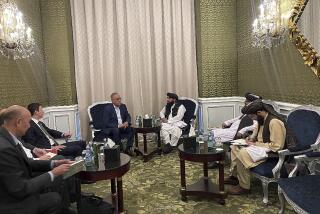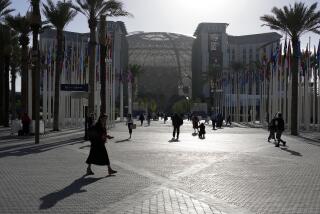Iraqis Scramble for Seats to Select New Council
BAGHDAD — Jawad Maliki has never been so popular.
A representative of the Islamic Dawa Party, Maliki spends his days fending off a steady flow of requests for what has become the hottest political ticket in Iraq: a spot in the upcoming national conference to select a de facto parliament.
“There’s pressure from all sides,” said Maliki, a member of the conference preparatory committee. “All of Iraq wants to be one of the thousand” -- one of the conference delegates.
The conference will assemble academics and activists as well as political, tribal and religious leaders. Over three days, the delegates will select most of the 100-member Interim National Council, which will act as a check on the powers of interim Prime Minister Iyad Allawi’s government.
It promises to be a messy experiment in Iraq’s new politics. The preparatory committee is scheduled to meet today to discuss a starting date and location. Delegates are still being chosen, and it seems unlikely that the Aug. 1 deadline to complete the selection will be met.
Organizers describe it as a necessary learning experience -- one whose lessons could help in parliamentary elections scheduled for January.
“It’s a way to prepare ourselves for the next step,” said Hanaa Edwar, an independent activist and preparatory committee member. “People will have to be ready for competition, and learn how to speak, and present their ideas.”
The conference will select 80 of the 100 Interim National Council members. The rest will be filled by members of the disbanded Iraqi Governing Council -- except for Allawi and four other former council members who took senior positions in the interim government.
The Interim National Council’s powers will be limited. It can approve the 2005 budget, appoint replacements to the presidency and override government decrees by a two-thirds vote.
But the process of selecting the council could be far more important than the result.
Maliki predicted that the conference would be a crash workshop in the realities of political consensus for a culture still emerging from decades of authoritarianism.
“It will teach the people to disagree, and form alliances and come to an understanding. They will have to learn the politics of agreement,” he said.
Maliki arrived at the party’s Baghdad office one afternoon this month after several hours of meetings to prepare for the conference. A stack of applications from potential delegates rested on a sofa. His handgun served as the paperweight.
Within minutes of sitting down, he fielded a call from a tribal chieftain in the southern town of Hindiya lobbying for a conference spot.
“My brother, I’ve been in meetings all day and can’t think,” Maliki snapped, referring the caller to the local selection committee for Karbala Governorate.
“This is a positive phenomenon. There’s a desire for political participation,” he said. “This was denied to Iraqi society, so now everybody wants to participate.”
But several prominent political and religious figures are boycotting the exercise -- arguing that anything short of direct elections is mere window-dressing for the continuing military occupation of Iraq.
“We won’t give them the legitimacy of our participation,” said Sheik Jawad Khalisi, an influential Shiite Muslim cleric who declined a conference invitation.
Khalisi is part of an alliance of Shiite, Sunni Muslim and Christian leaders and prominent academics who -- under the banner of Iraqi nationalist pride -- want nothing to do with either the national conference or the interim government.
The group includes Baghdad University political science professor Wamidh Namdi and Sheik Harith Dhari, a powerful Sunni imam who often acts as a go-between in negotiations for foreign hostages being held by militants.
“Every country that has been occupied throughout history has had some of its sons who cooperated with the occupation and some of its sons who resisted the occupation. We’re choosing to resist,” Khalisi said.
Maliki shrugged off the criticism, but acknowledged that the conference and council process was only a partial step toward representative government.
“We think [Khalisi] is impractical, and he thinks we’re collaborators,” he said. “In the end, we know we need an elected government ... but it’s OK to do it in stages.”
The conference is still in the planning stages. An 18-member working group meets several times a week to discuss prospective delegates and set guidelines for provincial committees in each of Iraq’s 18 governorates.
Urban areas will be granted one delegate for every 50,000 residents. Political parties categorized as large, medium and small will receive six, three and two seats, respectively. High-ranking former Baath Party members are excluded, with some exceptions. A quarter of the delegates must be women. Final selections must be approved by the 99-member conference preparatory committee.
The “big tent” conference model is based loosely on Afghanistan’s national loya jirga assembly, which was used to choose that country’s current government. Lakhdar Brahimi, the former United Nations envoy to Iraq, oversaw the resurrection of the loya jirga during his previous assignment in Afghanistan.
The loya jirga was, however, an institution rooted in Afghan history, whereas the Iraqi conference organizers have to create a similar structure from scratch.
Foreign Minister Hoshyar Zebari said the logistical and security considerations for the event were formidable.
Once the conference begins, many are expecting political parties and tribal alliances to win out. Jabber Habib, a Baghdad University political science professor, declined an invitation, predicting that major parties represented by the former Governing Council members would dominate the proceedings.
“It will be mostly a chance for parties to push their people. So it’s not really worth it for an individual like me,” he said.
Edwar, the independent women’s activist, said she expected some backroom deals among the major players. She also predicted that there would be “a corner for some independent voices.”
Maliki’s Dawa Party appears to have already formed a fledgling alliance with another Shiite party, the Supreme Council for Islamic Revolution in Iraq.
Maliki said many of the Islamic parties shared common interests and denied accusations of a Shiite power play.
More to Read
Sign up for Essential California
The most important California stories and recommendations in your inbox every morning.
You may occasionally receive promotional content from the Los Angeles Times.










